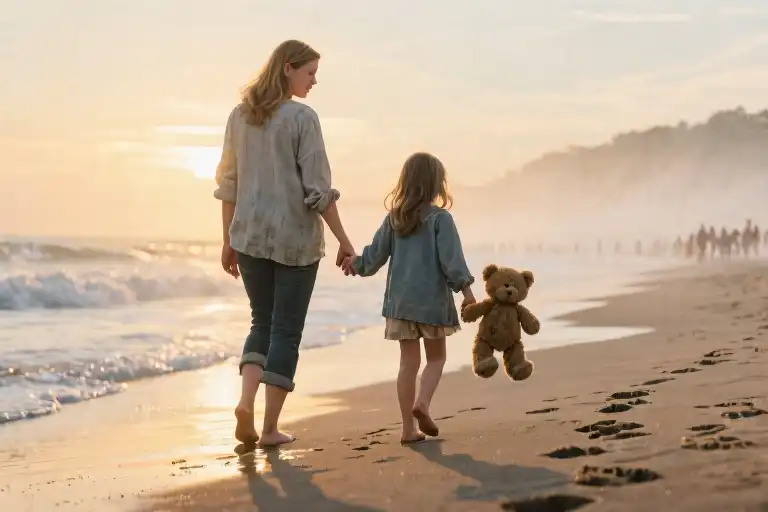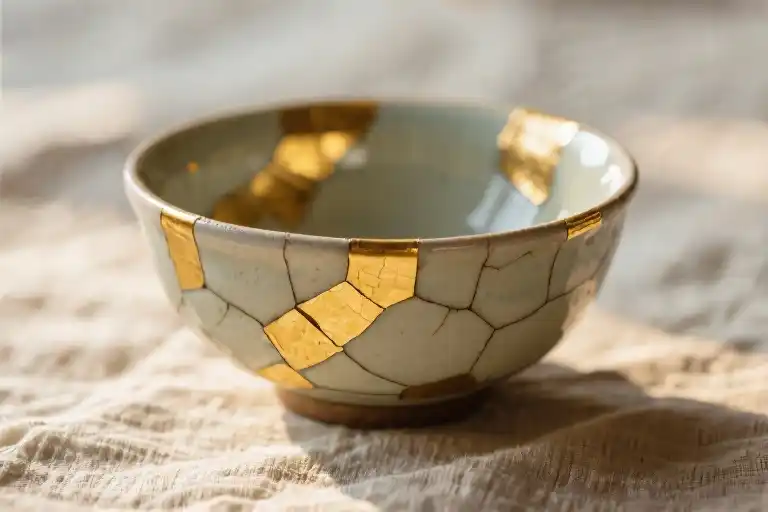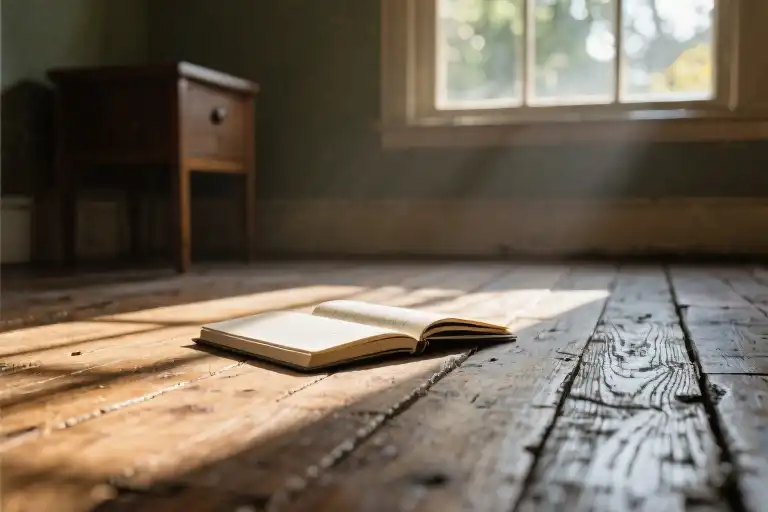The salt air stung my nostrils as my small fingers curled around my mother’s trembling hand. I was five years old, clutching a threadbare teddy bear with one arm while dragging an empty suitcase behind me with the other. The wheels caught on uneven boardwalk planks, making hollow knocking sounds that mirrored the emptiness in our pockets.
‘Empty hands catch new blessings,’ Mom whispered, more to the roaring ocean than to me. Her denim jacket smelled of gasoline and regret from our three-day Greyhound journey. Somewhere between Nevada and Oregon, she’d stopped calling it ‘running away’ and started calling it ‘our adventure.’
I didn’t understand why blessings needed catching until I saw her face that first morning in Rockaway. The way her chapped lips parted when Atlantic spray misted our motel window, how her shoulders relaxed when tides replaced traffic sounds. Our kitchenette’s fluorescent light revealed water stains on the ceiling shaped like seahorses – ‘See Krissy? Even the mold welcomes us,’ she laughed, tracing the patterns with a chipped nail.
That first week, we played a game called ‘beach treasure.’ While Mom scanned help wanted ads at the laundromat, I’d collect sand-smoothed glass and broken shells. ‘These are our first blessings,’ she’d say, lining them on the windowsill where afternoon light turned them into stained glass. At night, I’d press my ear to the thin wall separating our room from the ocean, imagining it breathing just for us.
What the child in me remembered as magical, the adult now recognizes as hunger. The way Mom stretched a single tuna can over two days of meals. How we pretended saltines were pirate gold. But in that fragile summer between kindergarten and reality, the ocean became our alchemist – transforming empty pockets into possibility, loneliness into something almost holy.
Years later, cleaning out Mom’s apartment after rehab, I’d find those beach treasures in a Folgers can labeled ‘Krissy’s First Savings Account.’ The shells had crumbled, but the lesson remained: sometimes you need to empty your hands before life can fill them.
Salt-Crusted Doorknobs
The motel room smelled like old seaweed and regret. At five years old, I traced the water stains on the wall with my finger, pretending they were seahorses galloping toward the ceiling. My mother called them ‘nature’s artwork,’ but I saw how her shoulders tensed when another flake of paint drifted onto the worn carpet.
We played our treasure game every morning after the breakfast we couldn’t afford. Mother’s empty pockets jingled with sand as we walked the shoreline, our bare feet leaving temporary marks that the tide would erase by noon. ‘Look for the blue ones,’ she’d say about the mussel shells, though we both knew color didn’t matter when hunger made everything gray. I collected them in the hem of my dress—a moving mosaic of broken things that could still shine.
The first time I saw her wade into the surf, her sundress ballooning around her like a jellyfish, I thought she might keep walking until the ocean claimed her. Instead, she spread her arms wide as if testing the wind, her laughter saltier than the spray. ‘Feel that, Krissy?’ she called over the waves. ‘That’s God breathing.’
Back in our kitchenette, I arranged my shell collection on the windowsill while mother boiled water for instant noodles. The afternoon light through the warped glass made the shells glow like stained glass in a church—our own cathedral of found objects. Outside, the Pacific murmured promises we couldn’t quite hear.
That night, I pressed my ear to the thin wall and listened to the ocean argue with the shore. Somewhere between the crashing waves and the rattle of our ancient refrigerator, I heard my mother crying. Not the loud kind from before we left the city, but quiet sobs that disappeared into the hum of the mini-fridge. I pretended not to notice when she slipped outside, the screen door whispering behind her.
Morning revealed her footprints in the damp sand leading to the water’s edge and back again, like parentheses around some secret she’d told the tide. The seahorse stains on our wall seemed to have multiplied overnight.
Morning Rituals by the Sea
Before dawn’s first light touched the shoreline, she’d already be moving. The motel’s thin walls couldn’t mask the sound of her bare feet on linoleum, the metallic click of glass bottles being arranged in her canvas bag. Five-year-old me would press my face against the salt-crusted window, watching her silhouette merge with the retreating night.
The Ceremony of Empty Bottles
She had a particular way of walking toward the waves—not the hurried strides of our arrival, but something between a surrender and an approach. Kneeling where wet sand met dry, she’d line up twelve empty jam jars (saved from the diner where she sometimes washed dishes). Each morning, she performed this ritual with the precision of a priest preparing communion.
‘Watch how she breathes,’ Mom would whisper as the tide exhaled foam around her ankles. She’d fill each jar three-quarters full, leaving room for what she called ‘the holy trinity—air, light, and possibility.’ The bottles glowed amber in sunrise light, suspended between her fingers like captured fireflies.
The Stain at the Bottom
One October morning when frost glittered on seaweed, I noticed something different. Among the usual collection of seawater samples stood a shorter, wider bottle I’d never seen before. Its liquid caught the light differently—darker, with viscous streaks clinging to the glass. When I tilted it, the sediment left behind resembled the rust stains in our bathroom sink.
Mom snatched it away too quickly. ‘Special medicine from the deep,’ she claimed, but her knuckles whitened around the neck of the bottle. That night, I heard the distinct clink of glass against the motel’s tin trash can—a sound that would repeat monthly, always following the arrival of envelopes with her sister’s return address.
Hymns Against the Storm
The true test of her faith came during November’s great gale. Rain found every weakness in our roof, drumming against pots we’d placed strategically on the floor. Wind screamed through cracks in the window frame, mimicking the wails of drowning sailors from her stories.
Instead of fear, she opened our door to the tempest. Standing ankle-deep in invading seawater, she sang—not the hymns I’d heard in passing churches, but something older. Her voice tangled with thunder as she conducted the chaos with empty hands:
‘You want my tears? Here they are! You want my rage? It’s yours! But you’ll never take our morning light— that’s mine to keep.’
In that moment, I understood her ocean religion. It wasn’t about worship or mercy, but the terrible privilege of standing before something vast and refusing to look away. The brown-stained bottles were her confessionals; the storms, her absolutions.
By dawn, the tempest had stolen three jars from our windowsill. She simply collected new ones, humming as she picked sea glass from the wreckage. ‘See how the ocean returns our gifts?’ she murmured, pressing a piece of cobalt glass into my palm. Its edges had been softened by the very waves that had tried to destroy us hours before.
The Receding Tide Toys
The ocean left us gifts when it retreated each morning. I’d wake to the sound of gulls arguing over breakfast, their cries sharper than the salty air. Mom would still be asleep, her breathing uneven like the waves after a storm, so I’d slip out alone with my plastic bucket—the one with the cartoon lobster that had lost one claw.
The beach after high tide was our department store. Driftwood became pirate ships, their barnacle-encrusted sides perfect for imaginary battles. I’d drag the best pieces back to our kitchenette motel, leaving sandy trails that made the manager sigh. Mom never scolded me about the mess. Instead, she’d help me nail mismatched boards together, her hands steady despite the tremor that usually lived in her fingers before noon.
One September morning, the tide had pulled back farther than I’d ever seen. Exposed rocks glistened with stranded creatures—anemones closing like shy flowers, crabs scuttling sideways in protest. That’s when I saw it: a starfish clinging to a boulder, its five arms splayed like the drawings in my preschool books. I crouched to watch its slow-motion escape when something glinted nearby.
Broken glass. Brown glass. The kind that came from the bottles Mom hid under the sink. The edges had been softened by the sea, but they still bit my fingertips when I picked up the pieces. Seven shards total, each catching the morning light differently. I lined them up in the wet sand, their curves fitting together like a puzzle missing half its pieces.
Mom found me there hours later, my knees patterned with sand imprints. She froze when she saw my arrangement—the glass shards radiating outward in a jagged star shape beside the real starfish. I expected her to cry. Instead, she sat cross-legged beside me, her sundress soaking up seawater.
“The ocean fixes things,” she said, more to herself than to me. She scooped up both creatures—the living and the broken—and waded knee-deep into the surf. When she opened her hands, the starfish clung for a heartbeat before letting go. The glass fragments disappeared instantly, swallowed by the foam.
That night, she didn’t ask for the grocery money. We ate peanut butter sandwiches and watched through our window as the tide returned, bringing with it the darkness and the distant lights of fishing boats. Mom hummed a song I didn’t recognize, her fingers tapping the rhythm against my shoulder where I leaned against her.
I dreamed of stained-glass stars moving beneath the waves.
The Whale’s Backbone
The storm had left its teeth marks along the shore. Pieces of what used to be a fishing boat lay scattered like broken promises—splintered wood bleached gray by salt and sun. I found Mom standing barefoot where the waves licked at the wreckage, her toes curling around a rusted nail embedded in the sand.
We didn’t speak. The ocean roared loud enough for both of us.
Her hands moved first, fingers tracing the curve of a broken plank. I watched her turn debris into possibility, the way she always did. That afternoon, we dragged the bones of the boat up beyond the tide line. The largest piece became a canvas when Mom propped it against driftwood, its surface still smelling of brine and fish scales.
This is how we heal, I thought. By making something beautiful from what the world has discarded.
She painted for three days without stopping. I brought her mussel shells filled with rainwater to clean her brushes. The colors surprised me—not the muted blues and grays of our daily life, but violent purples and the orange of warning flares. The figure emerging on the wood looked like Mom if Mom had gills and scales, her human hands reaching toward the surface while fish tails tangled in seaweed below.
At night, I’d wake to find her gone. I’d follow the moonlight to the shore where she stood ankle-deep in the surf, staring at her half-finished self-portrait propped in the sand. The ocean would whisper secrets I couldn’t understand, and Mom would nod like she agreed with whatever it said.
On the fourth morning, I found brown glass shards near her painting spot—the kind that used to hold her sadness. But this time, they’d been arranged in a spiral at the feet of her mermaid self. A broken crown for a broken queen.
We never talked about the bottles. Just like we never talked about how her painting eyes looked more alive than her real ones, or how the mermaid’s smile didn’t match the fear in the brushstrokes. Some truths are too big for words—they can only live in the spaces between what we create and what we destroy.
When the tide came in that evening, it didn’t take the painting. Mom had anchored it too well. The ocean just licked at the edges, tasting the colors, leaving salt crystals in the grooves of her fish-scale skin. I pressed my palm against the mermaid’s heart and felt the wood pulse like it remembered being part of something that once rode the waves without fear.
The Salt in My Palms
Twenty years later, I stand where the tide meets the sand, letting Pacific waves lick my bare feet. The ocean smells the same—that briny tang mixed with something ancient and unknowable. When I close my eyes, I can still hear my mother’s voice whispering through the sea foam: Empty hands catch new blessings.
My fingers unconsciously trace the lines on my palms, now etched with fine salt crystals from gripping the seawater too long. The ocean always leaves its mark, just like she said it would. Kneeling, I spot a sliver of weathered wood wedged between two black rocks—the bleached remains of our makeshift toy boat from that first desperate summer. The sight punches air from my lungs.
Downshore, a little girl in a yellow sundress dances through the shallows, her mother trailing behind with a plastic bucket. The woman’s laughter carries on the wind as her daughter shrieks at a retreating wave. Their footprints dissolve almost immediately in the wet sand, temporary as childhood.
I cradle the boat fragment like a sacred relic. This splintered wood once held my mother’s trembling hands as she sanded the edges smooth, her breath smelling of peppermints that couldn’t quite mask the other scent. We’d launched it together during low tide, watching the current carry our hopes toward the horizon. Now it’s returned, warped and whitened by decades of salt and sun, yet still stubbornly afloat.
The ocean took so much from us—our stability, our naivety, sometimes even my mother’s sobriety. But here in my palm rests proof it also gave: this broken artifact of resilience, these salt lines mapping where the waves kissed my skin. Maybe blessings weren’t meant to be caught after all, but received like tides—in cycles of taking and returning, of wreckage and renewal.
As I watch the unfamiliar mother tousle her daughter’s hair, I finally understand what my child-self couldn’t: the ocean never judged us for our empty pockets or our broken promises. It simply witnessed, vast enough to hold all our contradictions—the prayers and the whiskey bottles, the desperate grasps at redemption, the quiet moments when the water turned merciful as liquid glass.
When the wind shifts, I let the wood slip from my fingers back into the surf. Some stories aren’t meant to be kept. The tide will decide whether to preserve this fragment or grind it into sand, just as the ocean decided whether my mother’s paintings would float or sink, whether her hands would shake or steady when she faced the blank canvas each morning.
Walking away, I press my salt-crusted palms together like a woman in prayer. Behind me, the little girl’s delighted scream echoes across the waves—a sound as bright and fleeting as hope itself.





